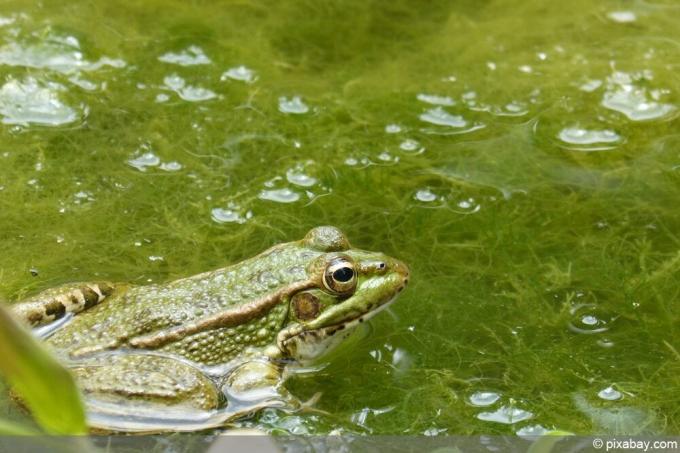

Table of contents
- pond mud
- time
- prevention
- Mechanical removal
- suction
- skim off
- dry removal
- biological distance
- disposal
Pond sludge is natural, important and occurs in every garden body of water - however, over time, rot can develop in it. This affects the water quality and the aquatic plants, as well as the pond inhabitants. For this reason, it is important to remove it regularly. There are basically two options for this and the question of disposal only plays a role in one variant.
pond mud
Pond sludge is created by completely natural decomposition processes in the water. Food leftovers, leaves, plant parts and the excretions of the fish form the basis. Microorganisms decompose these and thereby form the muddy residue on the ground. This is quite normal and helps to keep the water quality in balance.
However, if the layer of mud becomes very thick, it can be a problem. On the one hand, rot can form in it, which is noticeable through rising gas bubbles and a putrid smell. On the other hand, the pond sludge is rich in nutrients. If it is stirred up by fish, frogs, toads, amphibians or other movements in the water, these nutrients are redistributed in the water. This can result in increased algae formation and ultimately cause the water to "tipp over". This in turn leads to the death of water dwellers and plants.
Tip:
Pond sludge should be removed regularly and at least once a year.
time
The pond sludge can be removed in spring or autumn. The measure is necessary at the latest when gas bubbles rise. It should be remembered that the gases can no longer escape from a frozen pond. It can therefore make sense to remove the sludge again in autumn, especially if the fish are overwintering in the pond.
prevention
Preventative measures can be taken to ensure that too much pond sludge does not form or the formation is delayed:
- Quickly remove larger dirt, such as fallen leaves
- Feed appropriately
- Remove wilting plants
- use filters
- fish out algae

In this way, less organic material is available for the formation of the sludge. It will still occur from the fish excrement and sunken plant parts alone, but to a lesser extent.
Tip:
Mud formation can also be prevented by not locating the garden pond near trees or deciduous plants.
Mechanical removal
One way to remove pond sludge is to remove it mechanically by:
- suction
- skim off
- Dry removal
suction
The most common measure to date for removing pond sludge is suction. A special pond sludge suction device can be used for this. A purchase is not always necessary, because some hardware stores and garden centers also allow you to rent such a device. In the long term, however, it is usually more cost-effective to invest once in a pond sludge vacuum cleaner.
The substrate is mechanically removed with the suction device. It can be used easily and in a targeted manner – but it also has disadvantages. Because suction not only removes the sludge, but also useful bacteria and other microorganisms that are needed for the decomposition of organic components. The water quality is thus initially impaired. This also applies to other options for removing pond sludge mechanically.
skim off
The pond sludge can also be removed completely without electrical equipment by removing it by hand with a very fine-mesh net, bucket or similar container. The disadvantages of this method include:
- A lot of mud and nutrients are whirled up and distributed in the water
- Especially with large ponds very complex and exhausting
- Requires a lot of care not to remove any water creatures with it
In addition, the microorganisms are in turn removed to a large extent.
dry removal
If the fish do not overwinter in the pond without them, the water can be drained in autumn. After a few days, the pond sludge will have dried and can then be removed comparatively easily. The disadvantage of this method is that the pond has to be completely "run in" again in the spring. Water conditioners from specialist retailers can help to quickly restore the right water quality. Nevertheless, this variant is only recommended for smaller ponds.
biological distance
The biological removal of pond sludge is quicker, easier and involves significantly less effort. Special pond sludge removers can be found in specialist shops for this purpose. Available in powder or ready-to-use solution form, they break down sludge over days and weeks. The duration of the process depends on the thickness of the sludge layer. If a lot has already been deposited, it may be necessary to repeat the application.

The advantage here is that the agent is simply distributed in the water and neither the time-consuming removal of the pond sludge nor its subsequent disposal is required. In addition, the beneficial organisms are not removed either. However, the water turns milky white during use and the time it takes for the solution to dissolve successfully cannot always be accurately estimated. Therefore, this variant is only recommended if there is not already an acute and threatening siltation of the water body.
Tip:
Pond sludge remover can also be used to prevent excessive sludge formation, but it must be used regularly as recommended by the manufacturer.
disposal
Above all, the sludge from larger garden ponds seems difficult to dispose of simply because of the amount. If it was vacuumed or skimmed off wet, it is also very heavy and can therefore only be moved in small quantities. However, disposal only appears to be a problem at first. Because pond sludge is a very nutrient-rich, natural fertilizer. It consists of the remains of plants and food, fish excrement and has already decomposed. In principle, it is very similar to compost soil. It can therefore be added to the compost or used directly as fertilizer and does not have to be disposed of.
Care should only be taken with pond sludge that is already showing signs of rot. With this, it makes sense to first let it dry outside of the pond and then put it on the compost. In this way, potentially harmful substances are reduced and the risk of mold is lowered. If there is no need for the pond sludge as a fertilizer and if there is no compost available, it can nutrient-rich sludge as well as algae and other organic substances via residual waste or organic waste be disposed of.
Tip:
Pond sludge is relatively odorous, so appropriate clothing should be worn and skin protected when removing and disposing of it.
 garden editorial
garden editorial I write about everything that interests me in my garden.
Find out more about caring for a garden pond

Copper sulphate against algae | 5 tips for use & dosage
Copper sulphate is a proven remedy against algae infestation. However, dealing with it is not that easy, as it also damages or destroys plants and fish. can kill. For this reason and because of its environmental hazard, the use of products containing copper sulphate is being discussed.

pond is losing water | 4 reasons for water loss
A body of water in your own garden is an absolute eye-catcher. But what if the garden pond suddenly loses water? Is the pond leaking or is it because of the hot temperatures? How much evaporation is actually normal in summer?

Pond security: five ways of child security for garden ponds
A pond is a feast for the eyes in every garden. However, it can also become a deadly trap for children. A garden pond therefore absolutely needs a safeguard that reliably prevents children from falling in and drowning. Here you can find out what security measures are in place.

Green water in the garden pond - what to do against cloudy pond water?
Green water in the garden pond is annoying and can not only spoil the joy of the decorative body of water, but also become dangerous for its inhabitants. But what to do about cloudy pond water? We reveal it here.

Carbonate hardness: how to lower or raise the KH value
In addition to the total hardness, the carbonate hardness is the most important water value without which no garden or fish pond can function. It is crucial for all life in the pond and can stabilize all water-internal processes, including the pH value. Regular checks prevent deterioration of the water quality.
Build a pond heater yourself - instructions
A pond heater ensures that the water in the pond is always at the desired temperature. Of course, this is good for all living things in winter, especially in winter. Some game fish, which are often kept as ornaments, require higher temperatures than our “ordinary” pond fish. In smaller ponds, which like to freeze through in winter, the fish can remain in the pond and do not have to be caught out and overwintered frost-free.

